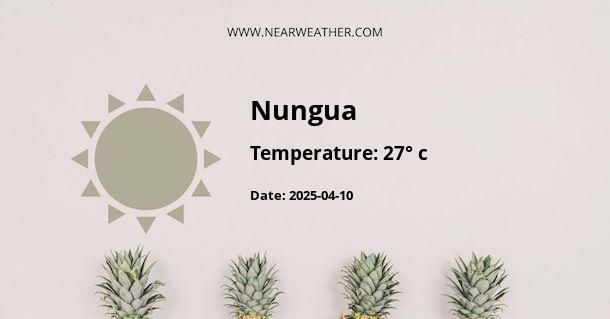Nungua, Ghana: Climate and Weather Year Round
Nungua is a vibrant coastal town located in the Greater Accra Region of Ghana. Situated along the Gulf of Guinea, Nungua experiences a tropical savanna climate characterized by distinct wet and dry seasons throughout the year. Understanding the climate and weather patterns of Nungua is essential for residents, tourists, and businesses alike. In this article, we will explore the climate and weather conditions in Nungua year round.
Temperature
Nungua experiences relatively high temperatures throughout the year due to its proximity to the equator. The average temperature in Nungua ranges between 25°C (77°F) and 30°C (86°F) during the day. The hottest months are typically between February and April, with temperatures often reaching above 30°C (86°F). The coolest months are usually between July and September, with average temperatures dropping to around 25°C (77°F).
Here is a table showcasing the average monthly temperatures in Nungua:
| Month | Average Temperature (°C) |
|---|---|
| January | 27 |
| February | 28 |
| March | 29 |
| April | 29 |
| May | 28 |
| June | 27 |
| July | 26 |
| August | 26 |
| September | 26 |
| October | 27 |
| November | 28 |
| December | 27 |
Rainfall
Nungua experiences a tropical wet and dry climate, with distinct wet and dry seasons. The wet season in Nungua typically starts in April and lasts until October, with August being the wettest month. During this period, Nungua receives significant rainfall, contributing to the lush greenery and vibrant vegetation in the region.
The dry season in Nungua usually spans from November to March, with December and January being the driest months. The amount of rainfall decreases significantly during this period, and the vegetation may appear less lush. However, the temperatures remain warm throughout the year, ensuring pleasant weather for residents and visitors.
Here is a chart illustrating the average monthly rainfall in Nungua:
"Nungua, Ghana experiences a tropical wet and dry climate with distinct wet and dry seasons. The wet season lasts from April to October, with August being the wettest month. The dry season spans from November to March, with December and January being the driest months."
Humidity
Being a coastal town, Nungua experiences relatively high humidity levels throughout the year. The proximity to the Gulf of Guinea contributes to the moisture in the air. Average humidity in Nungua ranges between 70% and 90%. The highest humidity levels are typically observed during the wet season when the air is more saturated with moisture.
Wind Patterns
Nungua experiences consistent coastal winds throughout the year. These winds provide a refreshing breeze, especially during the hotter months. The wind direction is predominantly from the southeast, with occasional variations depending on the weather systems in the region.
Overall Climate Summary
Nungua, Ghana has a tropical savanna climate with distinct wet and dry seasons. The town enjoys warm temperatures year round, with the hottest months being February to April. The wet season lasts from April to October, with August being the wettest month, while the dry season spans from November to March. Nungua experiences high humidity levels due to its coastal location and benefits from consistent coastal winds that provide relief from the heat.
Whether you are a resident or a visitor, knowing the climate and weather patterns in Nungua will help you plan your activities and make the most of your time in this beautiful coastal town.
A - Nungua's Latitude is 5.601060 & Longitude is -0.077130.
A - Weather in Nungua is 29° today.
A - Climate Conditions in Nungua shows few clouds today.
A - Humidity in Nungua is 70% today.
A - Wind speed in Nungua is 7.42 km/h, flowing at 160° wind direction. today.
